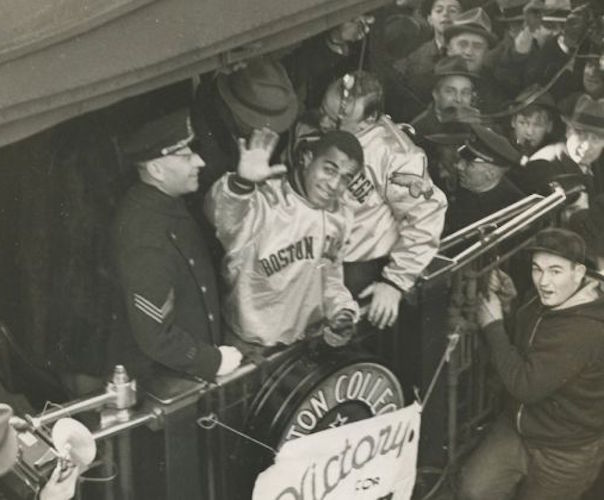Film Review: “Lou Montgomery: Legacy Restored” — Mission Accomplished
This compact documentary touches all the bases, presenting a poignant picture of the intersection of segregation, enlightenment, and failure in America’s institutions of higher education.
Lou Montgomery: Legacy Restored, directed by John Michalczyk, produced by Susan Michalczyk. Screening at the Museum of Fine Arts Boston, February 20 at 3 p.m.

A scene from “Lou Montgomery: Legacy Restored.”
By Paul Dervis
Tomorrow at 3 p.m. Boston’s Museum of Fine Arts is offering a one time only screening of a compelling new documentary from the folks at Boston College. It is literally ‘hot off the presses.’ The film was still being edited earlier this week, but from the footage I saw it is very much worth seeing. Produced and directed by B.C. professors John and Susan Michalczyk, the forty-five minute film explores the good and the bad of the Jesuit School’s early foray into the integration of its athletic program.
Lou Montgomery was a scholar/athlete out of Brockton Hight School in the late 1930s. Though small in stature, he was a gifted football player, recruited by several major programs nationally. Yet, with a partial scholarship in hand, he chose to go to New England’s own Boston College. At the time B.C. was determined to become a major player on the national gridiron scene, and to that end brought in Frank Leahy to coach. For Leahy, it was an important step to achieving his ultimate goal, becoming the head of the greatest athletic program of its era, Notre Dame. Lou Montgomery would be one of his vehicles to get there.
Although he was the first African American to play at Boston College, he was hardly the first at a big time program. UCLA had both Major League Baseball pioneer Jackie Robinson and NFL color-line breaker Kenny Washington in the same backfield. And Syracuse had an African American quarterback named Wilmeth Sidat-Singh in its starting lineup, though the media thought that he was of South Asian heritage because the athlete’s stepfather, who had adopted him, was from India. Sidat-Singh was able to play some segregated teams until famed African American Sportswriter Sam Lacy of the Baltimore Afro American “outed” him before a game against the University of Maryland.
With Charlie O’Rourke at quarterback and future pro players Mike Holovak and Monk Maznicki sharing the backfield, Montgomery turned out to be the most talented and efficient runner of the lot. In his junior year he averaged ten yards per carry, an unbelievable accomplishment. But he had to sit on the bench as often as he played… not because of injury, but Jim Crow. Though Boston College was quick to credit itself with progressive thinking by bringing Montgomery into the fold, it meekly knuckled under the segregated ‘Gentleman’s agreement’ Southern institutions demanded.
As a shameful cap to Montgomery’s illustrious 1939 season, B.C. accepted an invitation to play Clemson in the Cotton Bowl in Texas…but agreed that Montgomery was not to travel with the team, let alone play in the game. Further, he was pressured by his college to release statements that indicated all was right with him, and that he would be a happy cheerleader for his mates while listening to the game on the radio.
His senior year brought more of the same disgraceful treatment. In fact, Coach Leahy played him less and less, realizing he had to prep other runners for the inevitable Bowl game they would be invited to. This time it was the Sugar Bowl in New Orleans, a city that a quarter of a century later would be boycotted by the AFL All-Stars because of its racial politics. At least this time around the school brought Montgomery down for the ride, though he could not stay with his peers in the same hotel or practice with the team.
Teammate Mike Holovak, who went on to coach the Boston Patriots for much of the 1960s, wrote movingly of Montgomery and his plight in his memoir Violence Every Sunday (1967) “…the American man who is also by accident of birth a Negro, and should be proud of being a Negro, was victimized by a lot of stupid people who ground him into the dirt. And this was wrong.” Holovak, referring to the Sugar Bowl, went on to write that “we-as players-should have refused to play.”
This compact documentary touches all the bases, presenting an informative and poignant picture of the intersection of segregation, enlightenment, and failure in America’s institutions of higher education. It is a thought-provoking look at a forgotten moment of shame at an otherwise crusading school.
And it brings back into focus an admirable player in the war against racial injustice, an athlete who should not be forgotten.
The MFA screening will be followed by a Q&A with Susan and John Michalczyk and editor Cai Thomas.
Paul Dervis has been teaching drama in Canada at Algonquin College as well as the theatre conservatory Ottawa School of Speech & Drama for the past 15 years. Previously he ran theatre companies in Boston, New York, and Montreal. He has directed over 150 stage productions, receiving two dozen awards for his work. Paul has also directed six films, the most recent being 2011’s The Righteous Tithe.
Tagged: Boston College, documentary, football, Lou Montgomery, Paul Dervis
